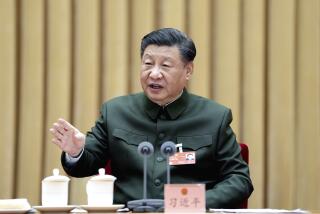China Intends to Double Its GDP by 2010
- Share via
BEIJING — Maintaining heavy government spending, China will attempt to double the size of its economy by the end of the decade, Premier Zhu Rongji told the annual session of China’s legislature Monday.
Zhu’s forecast was part of Beijing’s 10th five-year economic and social plan, a format held over from China’s command economy. The plan was submitted for the approval of the National People’s Congress.
“In the near future, we will continue to implement an active fiscal policy to increase investment and stimulate consumption,” Zhu said.
That policy will require Beijing to enter its fourth year of deficit spending, issuing long-term treasury bonds this year worth $18.1 billion, roughly the same amount as last year. The bonds will bankroll massive infrastructure projects, including gas pipelines, a new railroad to Tibet and a project to divert southern rivers to China’s arid north.
Finance Minister Xiang Huaicheng announced to the legislature today that China plans to raise defense spending by 17.7% this year, the Associated Press reported.
The double-digit increase would go to higher salaries throughout the ranks, he said.
The $17-billion military budget also is needed “to adapt to drastic changes in the military situation of the world and prepare for defense and combat given the conditions of modern technology, especially high technology,” Xiang said.
He was expected later today to announce a budget with a record deficit of more than $30 billion, up 4% over last year. That shortfall amounts to 2.7% of the country’s gross domestic product, a gap that economists still consider low by international standards.
Zhu forecast 7% growth per year between 2001 and 2005, significantly lower than the country’s average of 8.3% over the past five years. China aims to double last year’s GDP of $1.1 trillion by 2010.
“There should be no problem maintaining 7% growth. That’s a low target,” said Chinese Academy of Social Sciences economist Zuo Dapei. “In the U.S., a negative growth rate means recession. In China, a growth rate of 5% is a recession,” he said, citing popular expectations of improved living standards and noting that China maintained higher growth rates even in the deflationary depths of 1999.
Last year, China’s exports rebounded and its consumer price index rose 0.4% after declining for two years.
Although a growth rate of 7% would make China’s one of the world’s fastest-growing economies, Zhu said the economy requires major reforms to meet its targets.
Zhu claimed success in his three-year drive to pull unprofitable state-owned enterprises out of the red, but he said state firms still lack modern governance and are not competitive in international markets.
“We must lose no time in preparing for China’s entry into the World Trade Organization,” Zhu said. “Our entry into the WTO will bring us a number of new problems.”
Chinese lawmakers meeting in Beijing will have to revise more than 140 foreign trade statutes and abolish an additional 570 administrative regulations in order to meet WTO requirements.
The country will have to create 80 million jobs in the next five years to keep unemployment under the target 5% while finding work for 40 million laid-off workers and 40 million idle farmers, Zhu said.
More to Read
Sign up for Essential California
The most important California stories and recommendations in your inbox every morning.
You may occasionally receive promotional content from the Los Angeles Times.













